When I received my eCommerce master’s degree (that was a long time ago), eCommerce was much different than today. eCommerce is now a trillion-dollar industry and while everything else has changed since then, one thing that remained constant is the need for good eCommerce specialists.
As small and large companies continue to transition online, eCommerce Specialists are becoming increasingly important.
In this guide, you’ll learn what an eCommerce expert is, what does it do, what skills are needed to start a career in eCommerce, and how much money eCommerce specialists make per year.
What Does an eCommerce Specialist Do?
An eCommerce specialist is responsible for the design and execution of an eCommerce marketing strategy to promote the products and services of online businesses using all available marketing channels. An eCommerce expert helps business owners optimize their eCommerce marketing strategy to increase product sales.
An eCommerce Specialist takes charge of the following:
- Website marketing
- Website management
- eCommerce marketing campaigns
- Increasing rankings and traffic through eCommerce SEO
- Optimizing landing pages to increase sales
- Optimizing product pages for greater visibility in search engines
- Running paid campaigns on Google, Facebook, and other channels
- Dealing with email marketing funnels
- Running up-selling and cross-selling campaigns
In general, an eCommerce specialist is responsible for the smooth running of the eCommerce department of a business.
In large companies, the eCommerce manager is directly under the supervision of the digital marketing manager.
10 Steps to Become an eCommerce Specialist
These are the 10 steps to follow to become an expert in eCommerce.
- Understand how eCommerce works
- Learn the basics of SEO
- Become an expert on eCommerce SEO
- Get to know popular eCommerce Platforms
- Build PPC Campaign Management Skills
- Learn how to run content marketing campaigns for online shops
- Build Email Marketing Skills
- Master Conversion Optimization Techniques
- Get an entry-level eCommerce job
- Start your own eCommerce business
Step 1: Understand How eCommerce Works
The first step to anything new is to learn as much as you can about it. In the case of eCommerce, the best approach is to follow a good eCommerce course.
An eCommerce course teaches you the basic building blocks for your eCommerce career. Plus, most courses offer a certification—future clients will find you more credible and it can be a great addition to your CV.
The key here is not to follow a course to learn just the theory but use the acquired knowledge to build your skills. To get the most out of an eCommerce specialist training you have to apply each key learning in practice.
Practice what you learn with your own website or project and don’t be afraid to make mistakes. It’ll be a process of trial and error, but eventually, you’ll get the hang of it.
When choosing an eCommerce course, make sure that:
- It covers all areas of eCommerce (eCommerce SEO, tools, etc)
- It is taught by experienced eCommerce marketers - only marketers with experience in the industry and teach you strategies that actually work in real-life scenarios
- Comes with an eCommerce certification - since you’re willing to take the time to go through a course, it’s good to have a way to prove it.
- It’s updated to take into account the latest techniques and best practices
You can find a good course to follow in these two guides:
- Best Digital Marketing Courses - many of the top digital marketing course bundles include eCommerce as a separate course.
- Best eCommerce Courses - a list of courses dedicated to eCommerce.
Step 2: Learn the Basics of SEO
SEO is crucial for eCommerce businesses. If an online store doesn’t implement SEO strategies, they’ll miss out on a big chunk of their audience.
According to statistics users start their buyer’s journey through a search engine and if your website doesn’t have a presence on the top position of the results, it’s at a great disadvantage.
A quick look at the graph below shows that organic traffic is the most important traffic source for eCommerce websites (excluding direct traffic which is related to how strong a brand is).
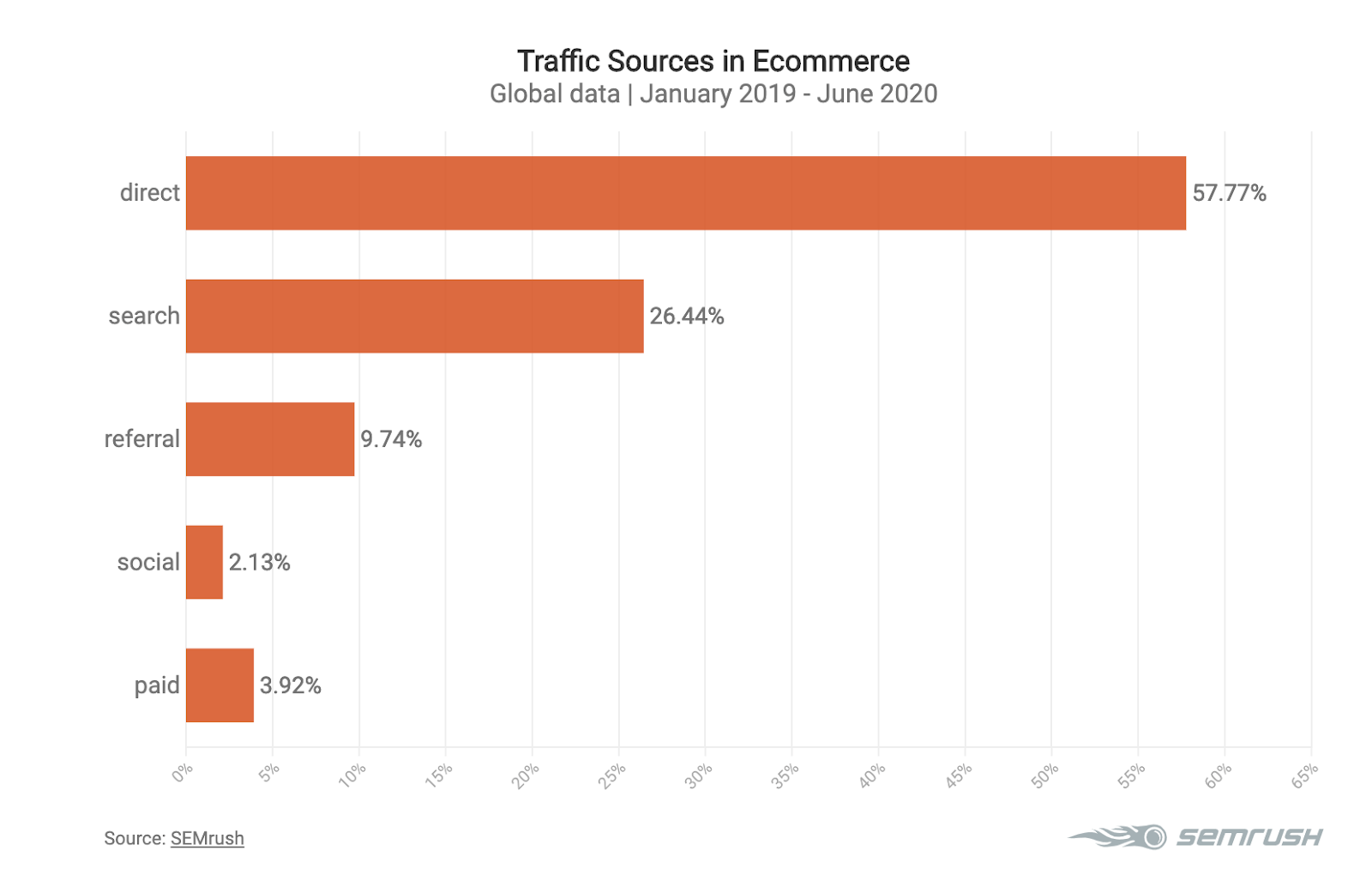
Before you dive into SEO for eCommerce websites, you should have a full understanding of the following:
- On-Page SEO - Content and page optimization
- Off-Page SEO - Website promotion
- Technical SEO - Optimizing a website for the crawling and indexing phase
You should know how each of the SEO types works and how to apply it to a business.
Once you get a good idea of how SEO works, you can then pay special attention to SEO for eCommerce websites, otherwise known as eCommerce SEO.
Additional resources to help you learn the basics of SEO
Step 3: Become an Expert on eCommerce SEO
This is a critical step in the process. If you want to become an eCommerce consultant, you’ll need to master eCommerce SEO.
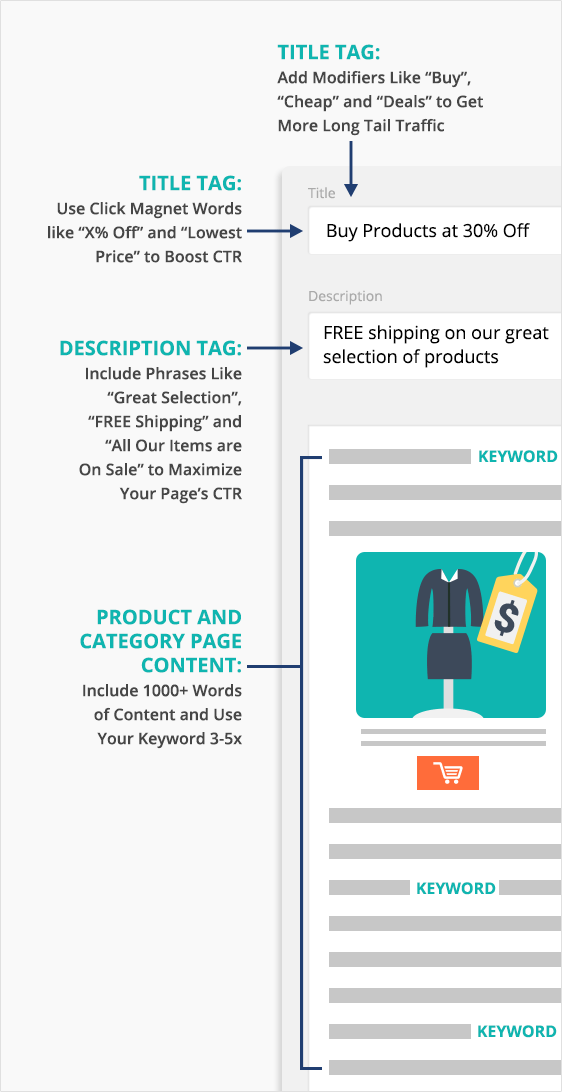
eCommerce SEO has to do with specific SEO techniques applicable to online shops. Things like product page optimization, site structure optimization play an important role in ranking your products page on Google.
So, before you continue any further, spend some time, and get a good understanding of all SEO practices specific to eCommerce websites.
Step 4: Get to Know Popular eCommerce Platforms
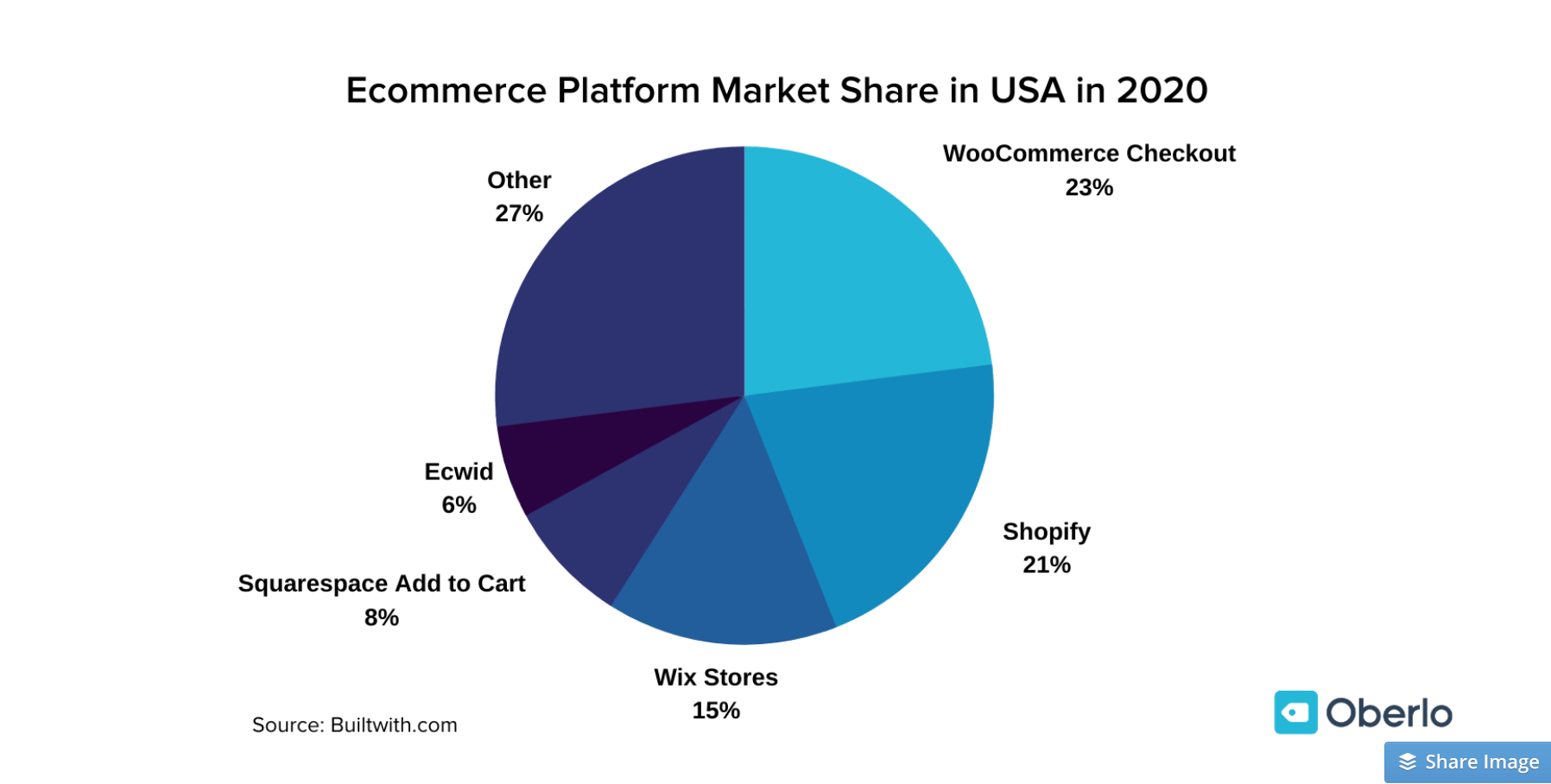
When you search for eCommerce Specialist careers, you may notice how some companies require knowledge about an eCommerce platform.
An eCommerce platform is the core of an online business. It handles all business operations and drives sales with automated technology.
Different eCommerce platforms work well for certain online businesses. You should become familiar with the following 4 platforms:
WooCommerce - This platform is designed for WordPress users. WooCommerce is a great online store builder and you can install it as a free WP plugin.
Shopify - Built specifically for eCommerce, Shopify helps users build their online store from the ground up.
Keep in mind that both Shopify and WooCommerce’s US market share combined make up 44%. As a majority of your clients use one of these platforms, I highly suggest learning how to use both.
BigCommerce -Similar to Shopify, this platform is specifically designed for eCommerce businesses.
BigCommerce isn’t used nearly as big as Shopify, but it’s still worth learning about.
Amazon - Not only is Amazon the world’s largest retail platform, but millions of retailers actively sell products through Amazon.
While Amazon sellers don’t have to handle the order and shipping process alone, they still need to optimize product listings, inventory, and reviews.
Ecommerce specialists have a good understanding of each platform. They know how they work and what strategies each platform needs.
Step 5: Build PPC Campaign Management Skills
Also known as pay-per-click ads, PPC is essential for an eCommerce business. Through PPC campaigns you can drive traffic and make sales in a short amount of time.
You’ve probably heard of Google search Ads or Bing Ads, but how do they work?
To put it simply, PPC campaign managers bid for ad placement at the top of a search engine. You pay a certain amount of money each time a user clicks on your ad.
Besides search ads, there are other ways to reach your target audience. You can take advantage of Google shopping ads, Facebook dynamic product ads, and retargeting ads.
As a modern eCommerce specialist, it is important to know how these campaign types work on each platform.
As Google Ads, Google Shopping, and Facebook Ads are the most popular forms of PPC, I suggest learning those first.
Resources to learn more about paid advertising
- A beginner’s guide to Google Merchant Center – how to get started with Google shopping feed (organic and ads).
- How to Advertise on Google For Free – Other ways (besides creating a Google Merchant Account) to advertise your products on Google.
Step 6: Learn How to Use Content Marketing for Online Shops
I’m sure you’ve heard of content marketing for bloggers, but what about eCommerce shops?
Content marketing is a great addition for eCommerce—it deepens brand awareness and builds long-lasting customers by providing valuable content for each stage of the buyer’s journey:
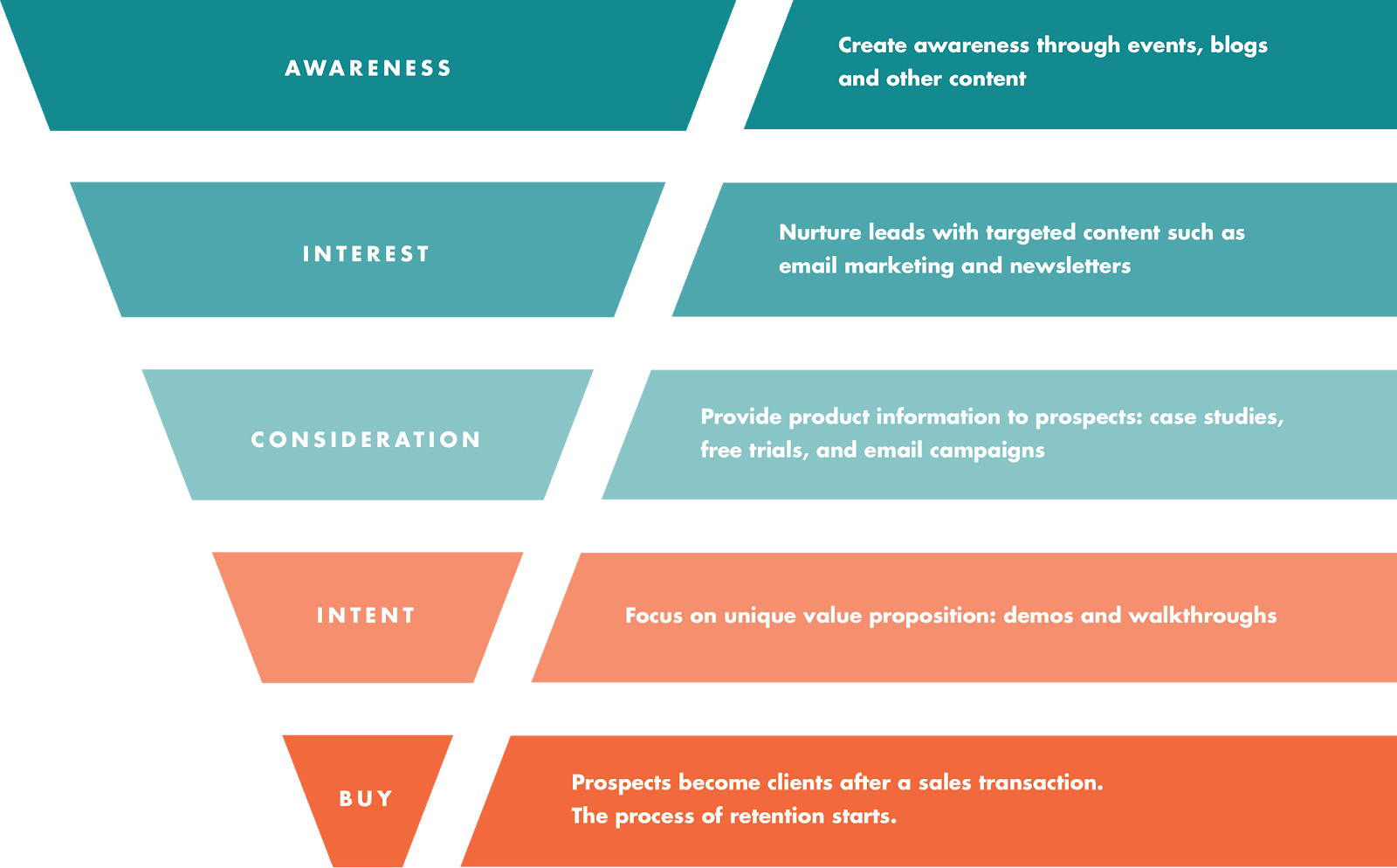
Awareness - A user becomes aware of your site and products, “Who is this brand, and what do they sell?”
Consideration - A user considers your products and other competitors, “Why should I buy from this brand?”
Purchase - A user buys your products, “Am I satisfied with this brand’s product? Will I buy from them again?”
Retention - A user turns into a returning customer, “When will I buy a product from this brand again? Who should I recommend this brand to?”
Content marketing guides customers through this journey and answers the questions above with informative and user-friendly content.
Plus, PPC and content marketing work great together in eCommerce. PPC improves short-term sales while content marketing improves for long-term sales.
Step 7: Build Email Marketing Skills
As I mentioned in the introduction, a good eCommerce specialist should know how to use email marketing funnels to increase product sales.
Email is the most commonly used communication medium and a great sales tool for digital marketing professionals. You can use email to engage and inform customers about your business. In the long run, this builds a loyal customer base who won’t buy from your competitors.
You can also use email marketing to follow up with anyone who interacts with your PPC ads. It’s a great bridge between PPC and content.
Step 8: Master Conversion Optimization Techniques
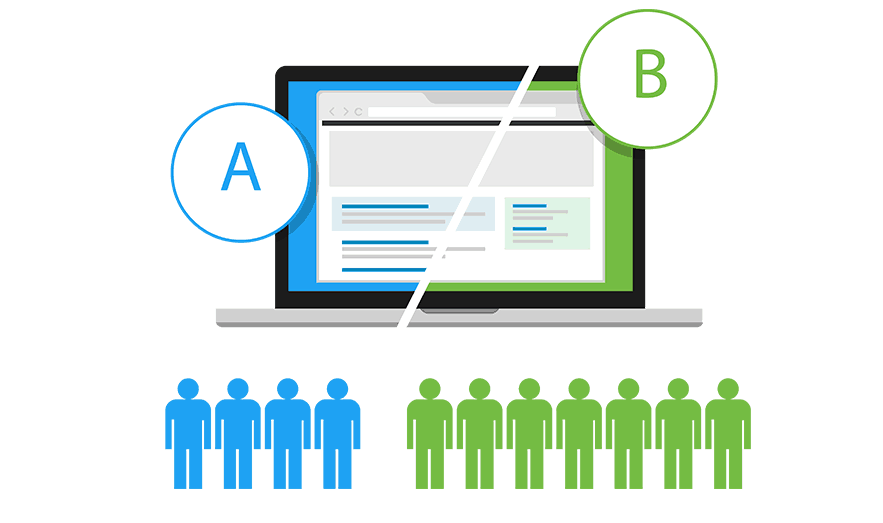
Imagine selling a group of 50 people one product each. Now, imagine selling a group of 20 people 3 products each.
In the second scenario, you sold more products with only 20 people. Conversion optimization increases your business’ product sales with less money and users.
When you do it right, conversion optimization can save you a ton of money and time spent on marketing. Plus, you’ll increase your ROI.
Why spend more money on advertising and products when you can optimize what you already have?
Step 9: Get an Entry-level eCommerce Job

Now that you’ve learned all the necessary skills to become an eCommerce expert, it’s time to put it to the test.
Entry-level eCommerce jobs give you the opportunity to work with a variety of clients. You’ll gain the right experience to build your eCommerce career and eventually build your own business.
You can work with a few different types of eCommerce businesses:
In-house - As an in-house eCommerce Specialist, you’ll optimize the company’s eCommerce strategy only. In-house is great if you want to dig deep into one industry.
Agency - Agencies work with different clients, sometimes in a variety of industries. This is a good choice if you want to learn how to apply eCommerce to different clients.
If you’re not sure what type of business to work for, consider the following questions:
- Do you want to work with small businesses or enterprise companies?
- Do you want to work with a specific industry?
- How do you want to run your future eCommerce business?
These questions will help you think more about what job will work best for you.
On that note, It’s ok if you don’t know the answer to all or any of these questions. The point of finding an entry-level digital marketing job is to learn more about your likes and dislikes within eCommerce.
If you’re serious about becoming an eCommerce expert, I recommend applying the skills you learn from your job to your own project.
This gives you room to try out different strategies and techniques. Plus, you’ll accelerate your eCommerce skills for your future business.
Step 10: Start Your own eCommerce Business
Applying your skills to an entry-level job will give you the confidence to start your own eCommerce business.
Does the thought of building your own eCommerce business intimidate you?
Starting a business can be a big leap, but think about all the pros:
- You choose your clients
- You choose your hours
- You choose your workflow
Everything is up to you. It might be overwhelming at first, but you’ll earn more freedom in the long run. As long as you have the experience and confidence to prove yourself, you’ll be on your way.
Plus, you can use the eCommerce skills you’ve strengthened to optimize and build your business. If you have more questions, our guide (how to start a digital marketing business) takes you through each step to build a successful online business.
eCommerce Specialist Salary
How much do eCommerce specialists make?
The average eCommerce specialist’s salary is $58K per year. This average may change depending on your location and experience.
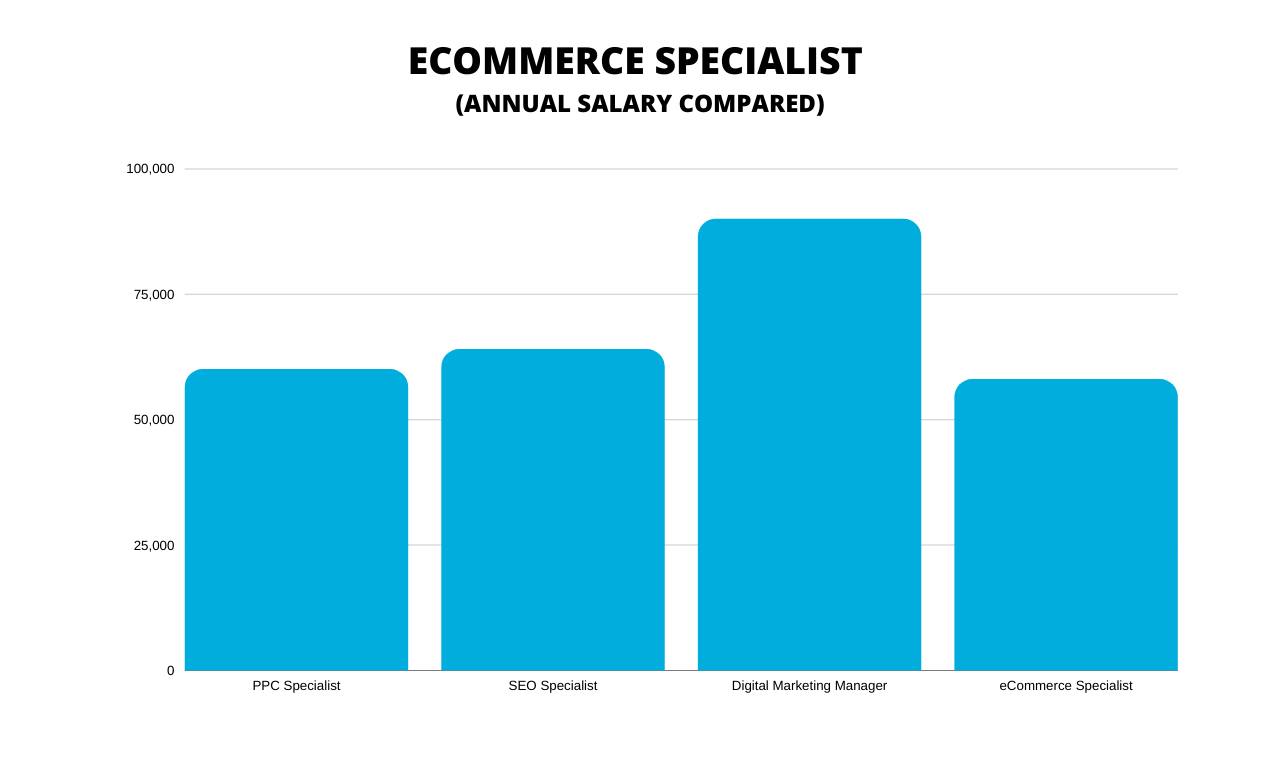
It is comparable to the average salary in digital marketing which is $55K per year but less than the highest paying positions in digital marketing. For comparison purposes:
- Digital Marketing Specialist (5 to 9 years of experience) – $55K per year
- Digital Marketing Manager (10+ years of experience) – $90K per year
- SEO Specialist – $64K per year
- Content Marketing Specialist – $84K per year
- Social Media Manager – $65K per year
- PPC Specialist – $60K per year
- Affiliate Marketing Manager – $71K per year
A good way to increase your salary is to start an eCommerce career and then as you get more experienced to move on to become a digital marketing specialist or a digital marketing consultant and make more money per year.
eCommerce Specialist Skills
Besides the specialized skills that we’ll see below, an eCommerce Specialist needs to have analytical, communication, and critical thinking skills.
Analytical skills - A successful online business strategy analyzes web data and online traffic to increase sales and ROI. This includes analyzing website metrics, customer relationships, and competitor’s information.
Communication - A successful online business builds lifetime customer relationships. An eCommerce expert understands what marketing strategies will communicate best with an audience.
Critical thinking - Ecommerce specialists don’t make decisions off on general ideas. Instead, they use data and research to identify the most effective online strategies.
Key Learnings
Becoming an eCommerce Specialist isn’t easy but it’s not impossible either. Each step is a long learning process and requires trial and error.
If you start feeling discouraged, think about the end of the tunnel. Imagine how accomplished you’ll feel once you’ve established your own eCommerce career. The work you put in will be worth it.
As you start your journey to becoming an eCommerce Specialist, remember to:
Practice - Start a website or business and apply everything you learn to it
Get experience - Once you’ve learned the required skills, apply for an entry-level eCommerce job, or find clients on your own.
Take new opportunities - Don’t be afraid to try new things along the way. Always be on the lookout for new opportunities, and put yourself out there.
As long as you follow each step and apply each strategy, you’ll become an eCommerce Specialist in no time.



